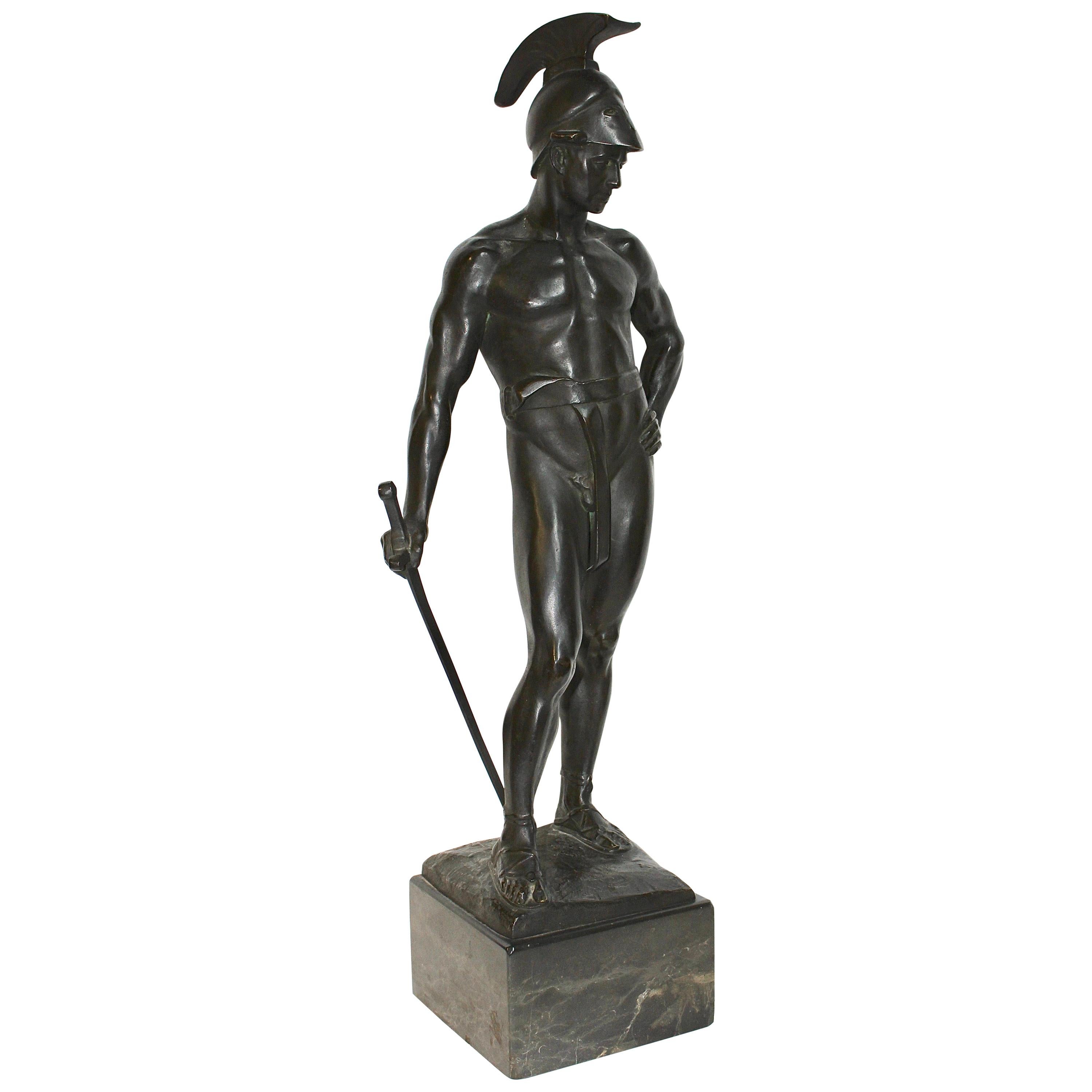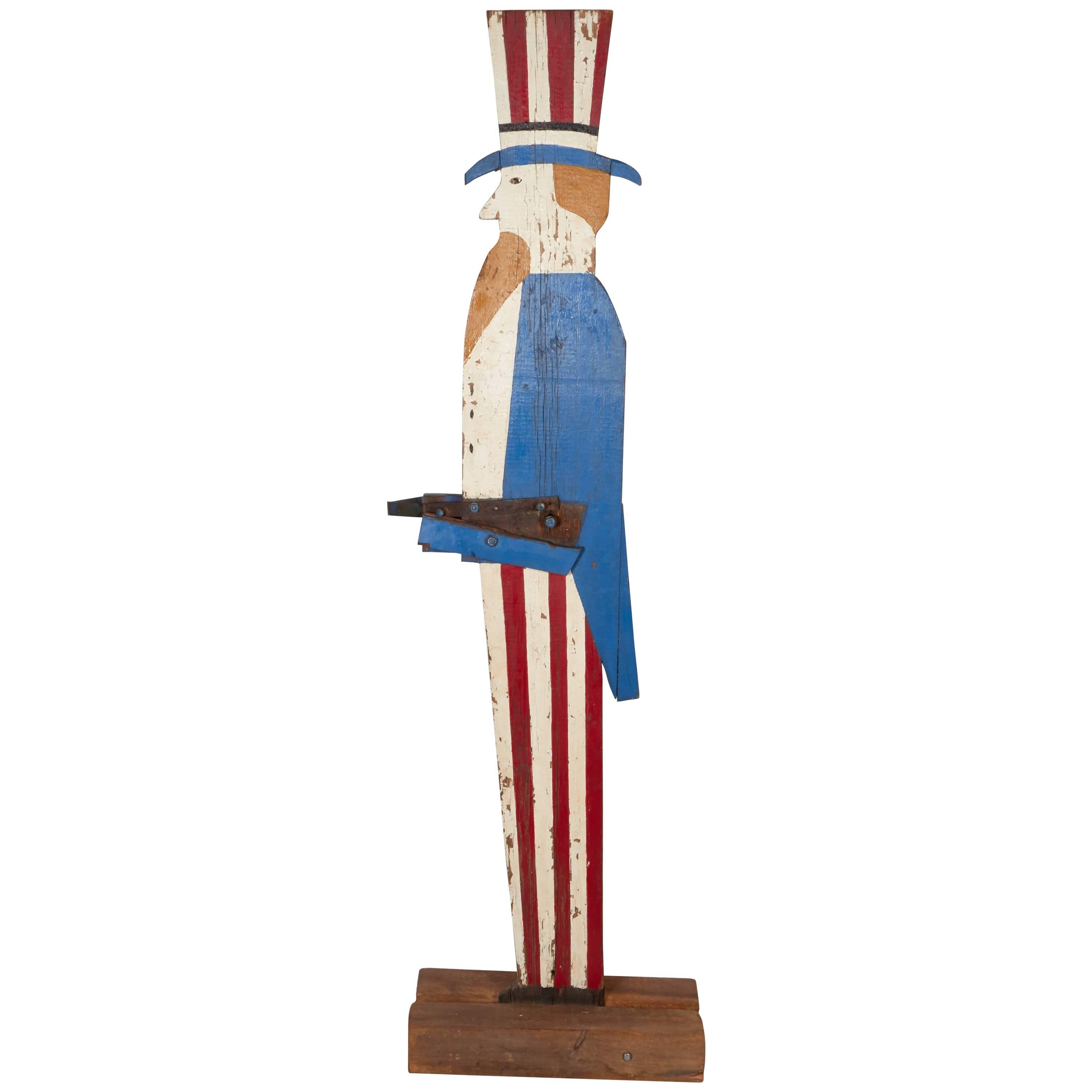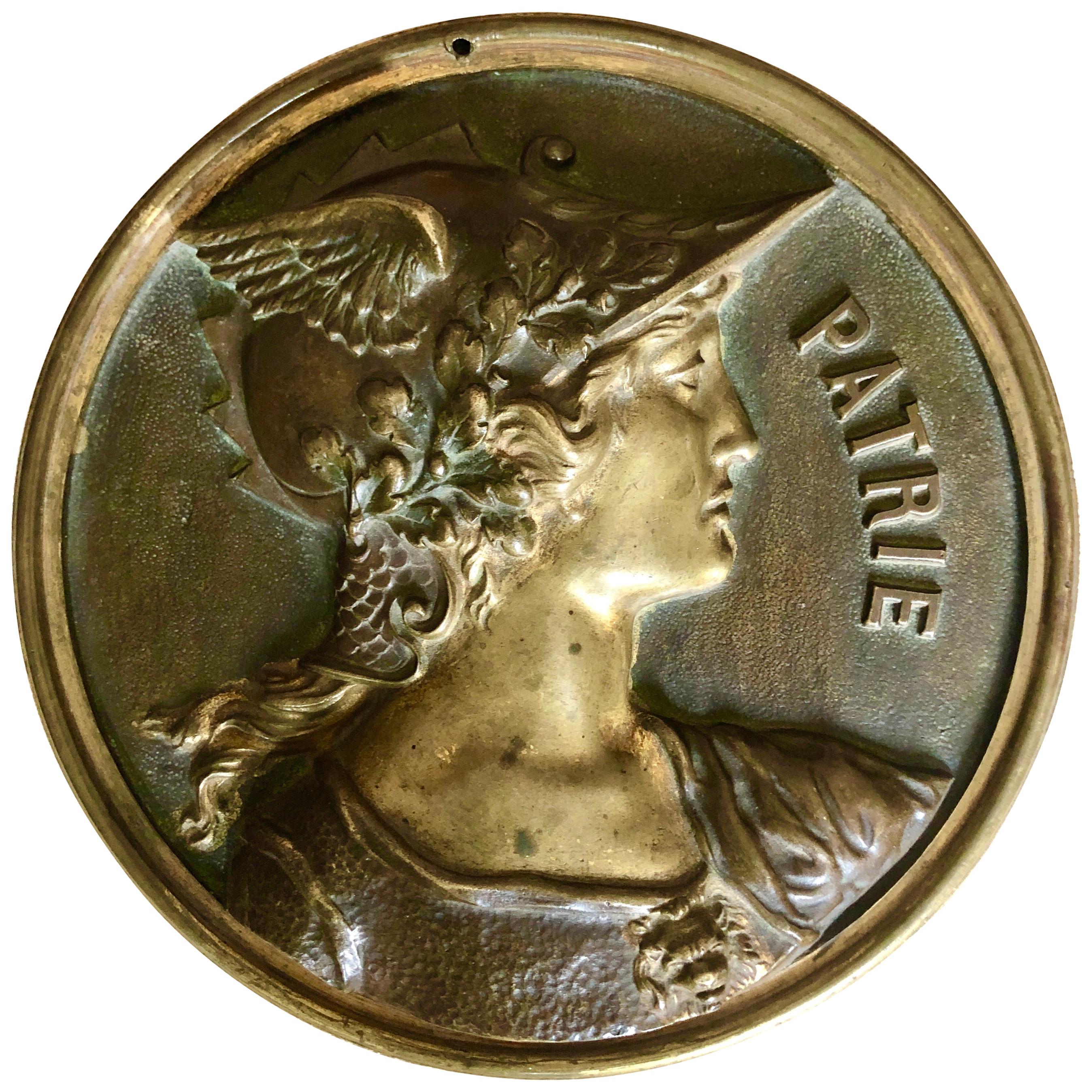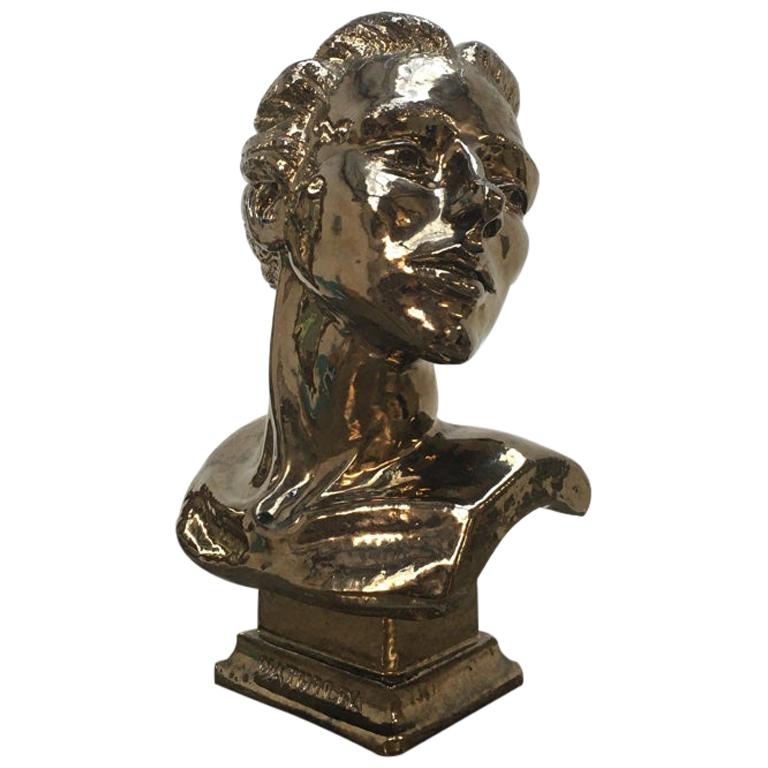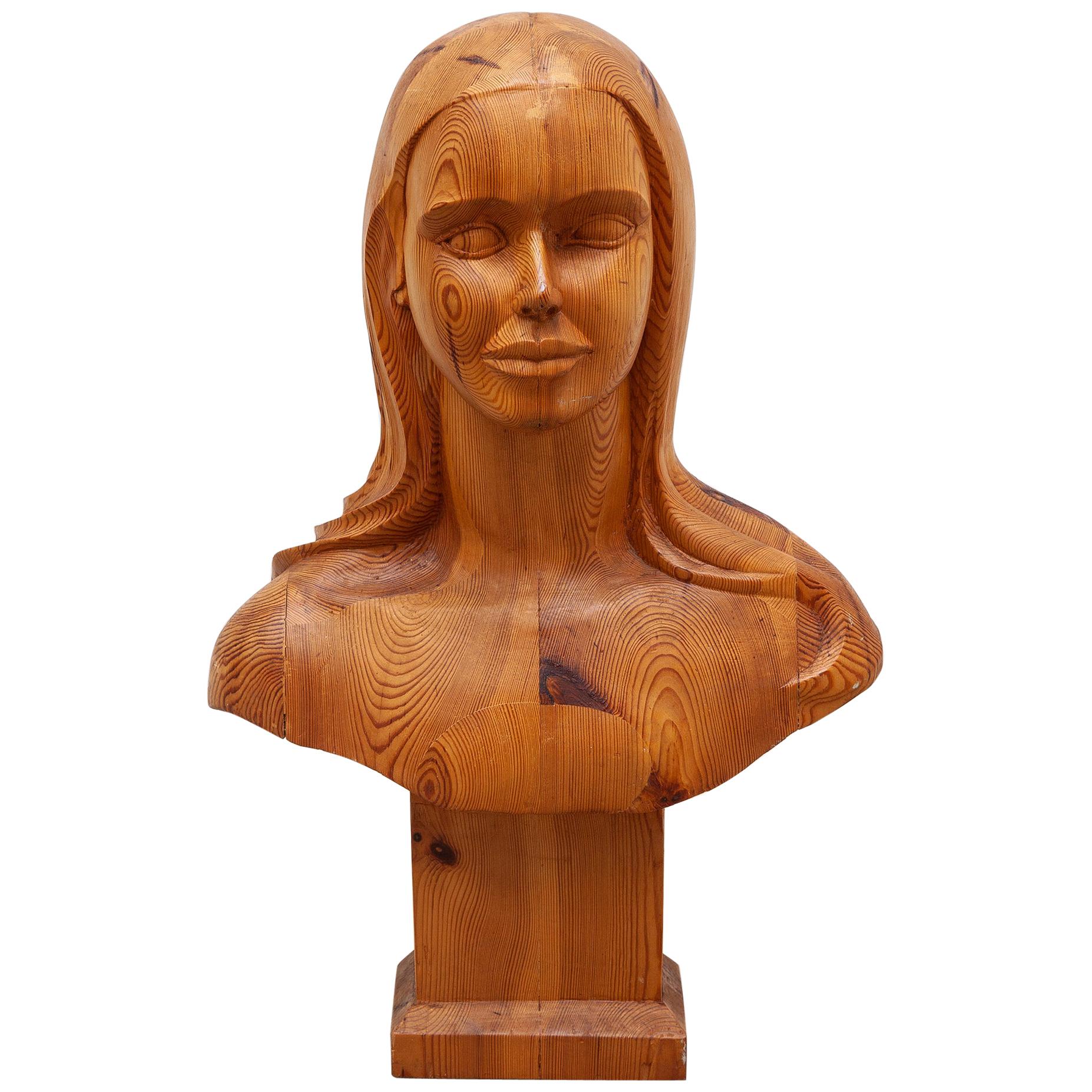Items Similar to Eagle and Flag Bronze Sculpture by Lorenzo E. Ghiglieri, Limited Edition 205/475
Want more images or videos?
Request additional images or videos from the seller
1 of 9
Eagle and Flag Bronze Sculpture by Lorenzo E. Ghiglieri, Limited Edition 205/475
About the Item
Presented is a patinated bronze eagle by Lorenzo E. Ghiglieri. The eagle is depicted landing on a tree stump, with wings dramatically raised. The stump is draped with a polychrome American flag. The bronze is signed "Lorenzo Ghiglieri 205/475," in the bronze and is mounted on a circular black marble base.
Lorenzo Ghiglieri (1931-2020) had a very long artistic career. Beginning as a teenager, Ghiglieri spent much of his life as an illustrator. During the Korean War and shortly afterwards, the U.S. commissioned work from Ghiglieri as a combat illustrator. He then continued on to advertisement illustration. After an exploration west, Ghiglieri dedicated the rest of his career to sculpting the American West. Known for his bald eagles, elk, and other wildlife bronzes, Lorenzo set out to capture natural beauty. His works have been gifted to some of the world’s most influential figures including England’s Queen Elizabeth II, U.S. President Ronald Reagan, Pope John Paul II, and Luciano Pavarotti, just to name a few.
The bald eagle is both the national bird and the national animal of the United States. The eagle motif has been widely used throughout our nation's history, most notably as part of our Great Seal. The founders of the United States were fond of comparing their new republic with the Roman Republic, in which eagle imagery, usually the golden eagle, was prominent. On June 20, 1782, the Continental Congress adopted the design for the Great Seal of the United States depicting a bald eagle grasping 13 arrows and an olive branch with its talons. Ghilieri’s statue is inspired by the symbolic history of the bald eagle, combining the powerful natural beauty of the bird with the patriotic symbol of freedom and strength.
Condition:
Very good condition. Patinated bronze. Colors on American flag are original to bronze, and subtle. Circular marble base. Slightly loose at the base.
- Dimensions:Height: 25 in (63.5 cm)Width: 15.5 in (39.37 cm)Depth: 15 in (38.1 cm)
- Materials and Techniques:Bronze,Patinated
- Place of Origin:
- Period:
- Date of Manufacture:Late 20th century
- Condition:Wear consistent with age and use.
- Seller Location:Colorado Springs, CO
- Reference Number:
About the Seller
4.9
Platinum Seller
These expertly vetted sellers are 1stDibs' most experienced sellers and are rated highest by our customers.
Established in 2010
1stDibs seller since 2011
402 sales on 1stDibs
Typical response time: <1 hour
- ShippingRetrieving quote...Ships From: Colorado Springs, CO
- Return PolicyA return for this item may be initiated within 10 days of delivery.
More From This SellerView All
- Political Debates Between Abraham Lincoln & Stephen A. Douglas, Limited EditionLocated in Colorado Springs, COLincoln, Abraham and Stephen A. Douglas. Political Debates Between Hon. Abraham Lincoln and Hon. Stephen A. Douglas, In the Celebrated Campaign of 1858, in Illinois, Including the Preceding Speeches of Each, at Chicago, Springfield, Etc.; Also, the Two Great Speeches of Mr. Lincoln in Ohio, in 1859. Cleveland: The Burrows Brothers Company, 1894. Limited edition printing, No. 168 of 750. Presented in ¼ leather and cloth binding, with gilt titles and raised bands to spine, with a new archival cloth slipcase. This is a special limited edition printing of the political debates of Lincoln and Stephen Douglas...Category
Antique Late 19th Century Political and Patriotic Memorabilia
MaterialsPaper
- Ann Hand American Eagle Silk ScarfLocated in Colorado Springs, COThis is a coveted, patriotic silk scarf, issued by American designer Ann Hand. The silk scarf was issued in a deep navy and gold colorway. At center is an art...Category
21st Century and Contemporary American Tapestries
MaterialsSilk
- 41-Star Printed Flag Waver, Celebrating Montana Statehood, 1889Located in Colorado Springs, COPresented is a very rare, 41-star flag waver celebrating Montana statehood. The flag is printed on linen and dates to 1889. The dark blue canton is printed with forty one stars in nine rows of alternating counts of five and four stars. Thirteen red and white stripes complete the flag’s design. The history of Montana statehood is a long one. Numerous Native American tribes originally inhabited the Montana Territory. Meriwether Lewis, William Clark, and the members of their expedition were the first explorers to document a journey through Montana and the lands of the Louisiana Purchase. Soon, forts were established to facilitate regular fur trading with Native American tribes. Missionaries and trailblazers followed. The discovery of gold in the early 1860s sped the creation of the Montana Territory. As settlers and gold prospectors entered Montana in the 1860s and 1870s, conflicts with the Native Americans arose. Perhaps the most famous clash between Native Americans and the United States military occurred in Montana on June 25, 1876. On that day, Sioux and Cheyenne defeated Lieutenant Colonel George Armstrong Custer‘s 7th United States Cavalry regiment at the Battle of the Little Bighorn. A year later, Nez Percé Chief Joseph surrendered in the Bear Paw Mountains of Montana. Lured by copper in the 1880s, mining brought even more settlers to Montana. Rich grazing lands for cattle and sheep attracted other pioneers. Each of the states in America, with the exception of the original thirteen, Texas, and California, was first organized as a territory before achieving admittance to the Union as a state. Originating with the Ordinances of 1785 and 1787, the territorial system provided the expanding U.S. with a method to govern frontier areas until they gained sufficient population and economic maturity to qualify for statehood. Not surprisingly, residents of frontier territories usually demanded quick admission to statehood so they could gain full control of their local governments. Montana was a territory for 25 years – from the creation of Montana Territory in 1864 until the territory was admitted to statehood in 1889. On November 2, 1889, North and South Dakota were added to the Union as the 39th and 40th states, the first time in history that two states were admitted on the same day. Montana became the 41st state on November 8, predating Washington, the 42nd state, by only three days. Flag makers were not in the business of making out-of-date flags. As a result of these rapid changes in the number of states, only a small number of 41-star flags or commemorative items were ever produced, thereby making any 41-star flag exceedingly rare. CONDITION: Good condition. This flag is printed, with a hemmed headband and fly end in a running stitch...Category
Antique 1880s American Political and Patriotic Memorabilia
MaterialsLinen
- 46-Star American Flag Printed in Drum Star ConfigurationLocated in Colorado Springs, COThis is an original 46-Star American parade flag, celebrating Oklahoma statehood. Each star on the flag's canton represents a state in the Union at the time. The official flag design would update every July 4th, to include any new states added to the Union in the past year. Oklahoma, the 46th state, entered the Union on November 16, 1907. As such, this 46–star flag was the official flag of the United States from July 4, 1908, until July 4, 1912. The silk flag has a dark blue canton with 46 white printed stars. The stars are printed in an 7-8-8-8-8-7 row configuration, or “Drum design.” The flag design is completed with 13 alternating red and white stripes, each stripe representing one of the original thirteen colonies. The land that comprises Oklahoma today was added to the United States as part of the Louisiana Purchase of 1803. Throughout the 19th century, the U.S. government relocated Indian tribes from the southeastern United States to the area, and by 1900, over 30 Indian tribes had been moved to what was originally called the Indian Territories. At the same time, ranchers in Texas began to move into the area in search of new pasture lands. Although stipulations in the Indian Relocation Act agreed that the land would forever be Indian Territory, the promise of fertile farmland trumped the government’s promise of sovereignty. On April 22, 1889, they opened the land to settlement by homesteaders, creating a land run in which settlers, called “Boomers,” were allowed to cross the Texas or Arkansas border at a particular hour to claim homesteads. Settlers who illegally crossed the border earlier to stake prime land were called “sooners,” which eventually became the state’s nickname. Wagons and the Santa Fe railroad carried cartloads of men and women to blank town sites and building plots, creating ten thousand-people communities in a matter of days. The following year, the region was further divided into Indian Territory and Oklahoma Territory...Category
Vintage 1910s American Political and Patriotic Memorabilia
MaterialsSilk
- Patriotic Eagle Bronze Sculpture After Jules MoigniezBy Jules MoigniezLocated in Colorado Springs, COPresented is a 20th century bronze sculpture, after Jules Moigniez, of an eagle on a rocky perch. The dignified eagle has its wings tucked and his head turned to the side, showcasing exquisite craftsmanship. Textured feathers, a rugged base, and sharp talons show Moigniez’s artistry at the lost wax process. The bronze sculpture sits atop a marble base. Jules Moigniez (1835-1894) was a French sculptor widely known for his highly detailed bronze works depicting dynamic wildlife. After studying under Paul Cromolera, Moigniez made a name for himself at his first exhibition in 1855 at the Paris Exposition Universelle. From 1859 to 1892, he showed regularly at the annual Saloons, with a total of 30 recorded works exhibited. A successful sculptor in France, Moignez increased his British and American collector base by exhibiting at the London International Exhibition of 1862. Intensely dedicated to the process of casting, Jules and his father decided to establish their own foundry in 1857, solely for the purpose of having complete control at every step, as well as the freedom to experiment. They created bronzes with unusually and unique finishes, experimenting in gilded, silver, and multi-color chemical patinas. Most of his works were cast using the lost-wax patina and were always chiseled and chased with great skill and care. While many bronze artists at the time focused solely on the subject, Moigniez incorporated highly detailed bases to accommodate his various animals. After Jules Moigniez’s tragic death in 1894, his father continued to cast his son’s bronzes from the Moigniez foundry. Just before Moigniez’s father also passed away, he sold the foundry and his casts to Auguste Gouge, a family friend who once cast bronzes for Jules' teacher Paul Cromolera. Gouge continued to produce Moigniez’s bronze sculptures until WWI. Eagle sculptures, such as this, gained such popularity in America because of the symbolic and historical meanings associated with the elegant bird. The eagle motif has been widely used throughout American history, most notably as part of our Great Seal. The founders of the United States were fond of comparing their new republic with the Roman Republic, in which eagle imagery was prominent. Since then, the eagle motif has appeared in allegorical engravings...Category
20th Century Sculptures and Carvings
MaterialsBronze
- 31-Star Printed American Flag, Celebrating California Statehood, Circa 1850Located in Colorado Springs, COThis is a rare 31-star medallion printed American flag, celebrating the addition of California to the Union. The flag is printed on silk and has a spectacular “Great Star” canton pat...Category
Antique 1850s American Political and Patriotic Memorabilia
MaterialsSilk
You May Also Like
- Large, Decorative Bronze Sculpture of a Spartan Warrior with Sword, Greco RomanBy Victor Heinrich SeifertLocated in Berlin, DELarge and decorative bronze sculpture of a Spartan warrior. By Professor Victor Heinrich Seifert. Signed. Excellent masterpiece. On marble base.Category
Antique 19th Century Austrian Figurative Sculptures
MaterialsBronze
- Very Tall Wooden Uncle Sam Flag Holder with Old PaintLocated in New York, NYA nicely carved, brightly painted figure of Uncle Sam mounted on two wooden blocks. This large piece, painted on both sides, stands at more than six feet tall. A Classic Folk Art pie...Category
Vintage 1960s American Political and Patriotic Memorabilia
MaterialsWood
- 20th Century Bronze Patine Plaque Portrait PatrieLocated in Sofia, BGMedallion in bronze Patrie. The relief portrait has beautiful slightly brown patina. France, circa 1905Category
Early 20th Century French Political and Patriotic Memorabilia
MaterialsBronze
- Bronze Glazed Stoneware Bust 'Mathilda' Probably Sweden, circa 1940sLocated in Melbourne, AUAn exquisite and mysterious portrait bust has come into our possession. Her name is Mathilda. The bust has been sculpted from earthenware clay and fired with a Bronze glaze. Given...Category
Vintage 1940s Swedish Mid-Century Modern Busts
MaterialsMetal
- French Women Bust Sculpture "Marianne" Godess of Liberty in Solid Wood, 1960sLocated in Antwerp, BEVintage French bust sculpture of a woman Marianne has been the national personification of the French Republic since the French Revolution, as a personification of liberty, equality, fraternity and reason, and a portrayal of the Goddess of Liberty...Category
Vintage 1960s French Mid-Century Modern Busts
MaterialsWood
- Torc, a limited edition patinated bronze sculpture by Vivienne FoleyBy Vivienne FoleyLocated in London, GB'Torc' is a limited-edition (3 + 2AP) patinated bronze sculpture by the British artist Vivienne Foley. Two have been sold and so there is only one piece left from the edition. Vivie...Category
2010s British Organic Modern Abstract Sculptures
MaterialsBronze
Recently Viewed
View AllMore Ways To Browse
Great Seal
Bronze Eagle
20th Century Flags
Gold Flag
Used American Flags
Seal Animal
Warring States Bronze
Roman Sculpture Original
World War Flag
Eagle Sculptures
Presidents Sculptures
Tree Bird Sculpture
Arrow Sculpture
Bronze Sculpture Seal
War Eagle
Bronze Eagle Sculpture
Eagle On Marble
United States Flag Vintage
